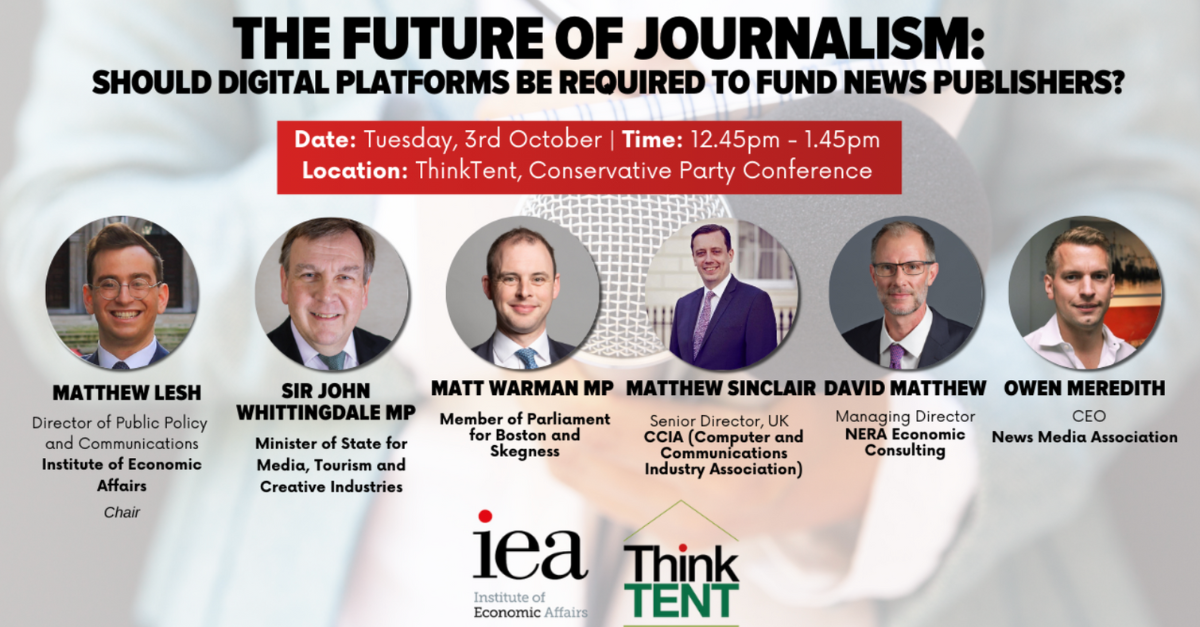Why all male panels are still a big problem...

There’s a lot of big news that’s flown out of the Conservative Party Conference this week, so you’d be forgiven for missing this one. However it’s caused quite a lot of controversy, and I believe rightly so.
A debate from The Institute of Economic Affairs, regarding the future of journalism, (something that impacts every one of us whether we like it or not), without a single woman in the line up. (There is also not a single active journalist in there either - another cause for consternation.)
The event series is ThinkTent – a joint venture between the Institute of Economic Affairs and the TaxPayers’ Alliance. On their website, they claim that “panels will tackle a wide array of important issues, from spurring economic growth and fixing the NHS to restoring freedom of speech and the future of British journalism.”
These are, as they say, very important conversations, and yet they’ll be heavily influenced by the lived experiences of only half of society.
I’m not completely ignorant to the challenges here. Having worked with events producers and planners in this space, I do understand and appreciate that it’s not always easy to find a good diverse range of speakers on a particular point on a short deadline.
However, a quick scroll through the rest of the agenda from the IEA shows a litany of 51 speakers across various topics. Just seven are women. One of those women is speaking twice so really, it’s only six different women.
Being generous then, that’s 14%? That feels like we’re not even trying...
It’s just a panel - does it really matter?
Obviously I think so. Having diverse speakers at these events isn’t just a PR play. It’s not simply about making sure you have a few women in the room to ‘look good’ and ‘avoid a social media backlash’.
These events are important. It's likely that the discussions raised here will be actioned somewhere. They might influence a new policy, or a change in standards across an industry. There are direct implications of these discussions and things like the media, the NHS and the economy surely deserve a good mixed debate.
More diverse voices will more accurately reflect the industry, and better represent the country we’re trying to improve. We’re in danger of overlooking seriously important issues without a range of perspectives.
Crucially, there are also a lot of brilliant women and non-binary people working in these industries that could have contributed some great food for thought. Can’t stress that enough.
So while the Matthews may all have very interesting points of view on the future of media, (and I’m sure that they do), normalising a completely one dimensional panel to discuss important issues does start to become a bit dangerous. Especially when the results of those conversations translate into changing industries that affect the general population.
Where do we go from here?
I’m an eternal optimist - and while it’s a slow movement, progress is progress.
I’m seeing a lot of companies trying to make sure they have better gender representation with events, panels and debates that they’re hosting. It’s not always perfect, and not everyone is making those commitments, but we’re inching towards a better position.
If you have any takeaways from this piece, make it these:
- Take time to ensure your discussion represents the people it needs to. The quality of the debate will be much better for it.
- If you are a known speaker in your circuit, and are asked to join a panel like the above, consider putting forward a colleague to offer some new and fresh thinking.
- Don’t view this as a threat to your speaking opportunities. There’s plenty of chances to speak and profile your work and there’ll inevitably be others.



